Mogaji Nurudeen Basunu was born in Ibadan in 1967 and he has never been to northern Nigeria. He communicates fluently in Yoruba and Arabic, but he cannot express himself in either Hausa or Fulfulde. This is true of many members of the Basunu family who number 3500, and originally hailed from Katsina State. A number of the females can speak Hausa, but the exact population is not very clear. Mogaji Basunu has 3 Yoruba wives and none of his 7 children can speak Hausa.
Meals
When prompted, the family provides a verbal list of the meals eaten in the various Basunu households beginning with the favourite meals. Tuwo, a meal made from ‘soft mashed rice’ and common in Hausaland, was at the bottom of the list, with Amala, a popular Yoruba meal made from yam, rising to the first position.
Mogaji wears a white turban which sits on him nicely. He tells me that the Mogaji or head of the family, is selected by the family and is then turbaned by the Chief Imam of Ibadanland. The interview takes place in the Zaure and there are many members of the family present. Both men and women are well dressed and they resemble their Yoruba neighbours in dress, speech and style.
Yoruba
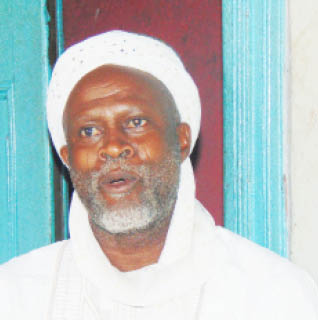
Yoruba is spoken throughout the interview except for those moments when interpretations are being done. From time to time, there is a debate in Yoruba as Mogaji Basunu and a few others seek to clarify a point, provide new ideas or take a second look at a matter. Then, the interview continues. There is a bit of a debate as to whether the architecture of the house is derived from Yoruba or Hausa, or if it is a combination of both.
Ibadan Explosion: Makinde hails Obi over visit, blasts Atiku
3 suspects to face trial for Ibadan explosion – Makinde
Zaure
The Zaure plays the role it normally plays in Hausaland. A google search indicates that Zaure is a Hausa word for a ‘large reception room or area.’ The Zaure is large enough to accommodate all of us. There are three arches in front of the Zaure and pillars help to support the structure.
When members of the family are speaking in Yoruba, they retain the Hausa word Zaure, when referring to that part of the house. This is a verbal relic of the Hausa roots of the family which have withered somewhat but not entirely vanished.
Uthman Basunu
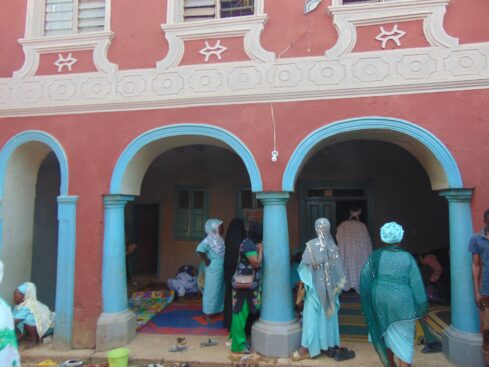
Sa’ad Abubakar, Imam of Sabo Ibadan, speaks about the Basunu family with excitement. This is in the course of an interview on the Hausa population of Sabo. According to him, Uthman Basunu – the family’s great grandfather came to Ibadan from Katsina in the 19th century, settled there, became the first chief Imam of Ibadanland, married from the Yoruba community and – almost two hundred years after – his descendants are largely Yorubanised. Their Hausa roots have now been replaced by or have merged with a strong Yoruba identity and influence. Identities can be fluid in Nigeria’s extensive social ecosystem. Uthman Basunu is the author of Teskiratl Kuritubiyat (How To Assist The Departed) written in the year 1850. The original manuscript and other texts written by Uthman Basunu are with the family.
Hausa
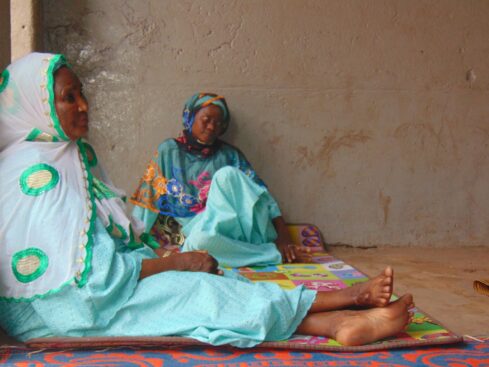
The Basunu family house is located in Ita Okoro, a part of Oja’ba, and this is not very far from the palace of the Olubadan of Ibadan. As the family members mention later, the house was built by local Yoruba artisans whose handiwork tended to reflect the northern roots of the Basunu family.
This explains the dual elements in the building which appears as Hausa to some visitors, and Yoruba to others. It speaks to two communities or world views in one breath. Today, there is more spoken Yoruba in the household whose floors, especially the upper section, are made of wood.
Family compound
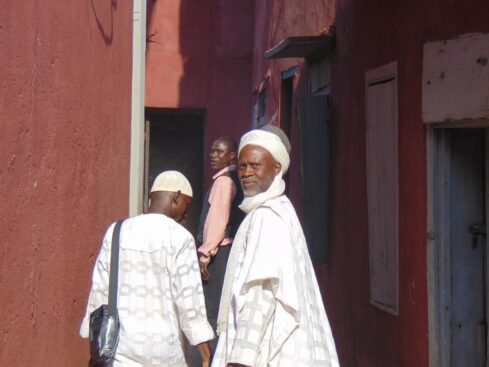
The building has a mosque, many rooms, several flights of stairs, windows, arches, horizontal designs on the walls and several dark passage ways. It is an impressive bit of architecture which communicates times and circumstances of long ago. The main approach to the house and another section through which a visitor may exit, are both remarkable in different ways and will delight the visitor.
Yorubanised
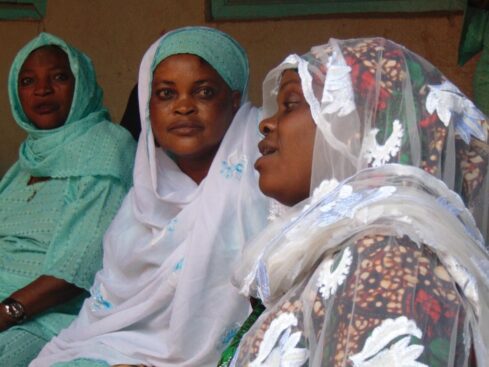
Professor Idris Shaba Jimada of the department of History, Ahmadu Bello University, Zaria, who specializes in Contemporary and Comparative Historical Studies, comments on the word Yorubanised. “This is a process of acculturation which could take place in a few decades. The descendants of the man who left Katsina for Ibadan in 1835 and settled there, may not even recall that they came originally from Katsina. The factors that allow for this include loss of language, distance from place of origin, and probably conducive condition of the new home.”
“Some of the clerics will arrive at a place and cease being migrants. In the course of time, they will take on the nativity of the area where they settled and intermarry with the inhabitants and begin to raise their own children,” adds Afis Oladosu, a professor of Arabic and Islamic studies at the University of Ibadan, speaking in the same vein.
Courage
He states “those scholars left their comfort zones and began to explore. It was a time when the airplane was not easily within reach, the railway system wasn’t within reach, those were times when people travelled by trekking or at best using maybe their horse or camels. Some of them would die on the way, some of them would not see their families again.”
Sambo Eleruja
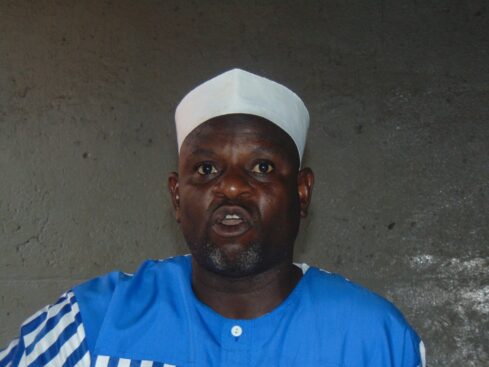
“As a historian, I am not surprised about the story of Uthman Basunu. Examples like that are numerous in our historical landscape. Let me give you another unique example. This is the story of Mallam Sambo Eleruja in my family compound in Ogbomoso. This man originally migrated from Sudan in the 19th century. He settled briefly in Maiduguri. From there he moved to Ogbomoso where he was accommodated by the ruler of the town. Eleruja means the carrier of weapons. That name was derived from the conflict between those who worship idols, deities and so on and an Islamic cleric. He used Islamic means to defeat those with traditional charms. That’s why they called him Eleruja,” says Rasheed Olaniyi, a professor of African History and Head Department of History, University of Ibadan. He has carried out research work on migration, intergroup relations and identity politics.
Assimilation
Olaniyi sheds more light on the career of Eleruja “Despite being a Muslim, he was assisting a leader who was not a Muslim against a Muslim dominated state.”
He continues “The example of Mallam Basunu is just one of the several households that were assimilated into Yoruba. What triggered the transformation is the issue of integration, and the fact that people value where they settle. They intermarry, and customs and traditions are accepted by the newly arrived clerics.”
Peace of mind
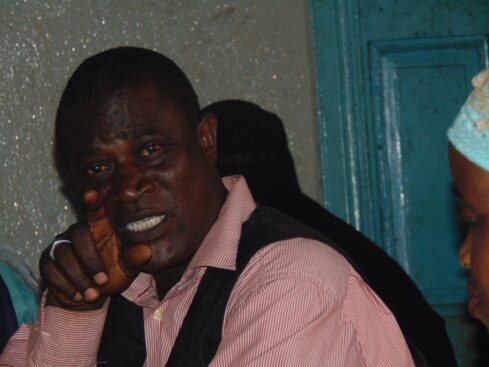
“There are many people from Ogbomoso in Funtua, Katsina State, who have become Hausanised. It is because they feel comfortable in terms of where they reside. The relationship between Hausa and Yoruba has endured for a long time, its an age long relationship. People love where they prosper, where they have peace of mind, where the family flourishes,” he stresses.
During my first visit to the family house last December, the Mogaji or head of the family was not at home. On the day of my visit, a few persons sat within the Zaure. A lady hurried away to get her phone in order to provide the Mogaji’s number.
Basunu
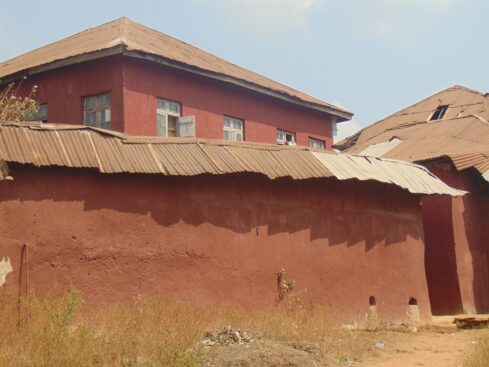
On the meaning of the name Basunu, Mogaji Basunu reveals “The meaning of Ba is Father. Sunu is the name of a King. Basunu therefore means the father of the King.”
He further explains “Basunu is a real name. Basunu was the son of a King in Katsina, but when his father died, he ought to have become a King but instead Muhammadu Awwal, his younger brother, was appointed the King. This was in the year 1833. So, they left the elderly person and the junior brother was crowned King as that time. Thus, they now called the elderly person Baba Oba, as we would express in Yoruba. They called him the father of the King or Basunu.”
“He came from a palace in Katsina. He was a prince of one of the royal families and his name was Uthman Abu Bakr. He was an Islamic scholar,” mentions Ridwan Adebayo Basunu, lecturer in the Arabic Institute of Nigeria, Elekuro, Ibadan.
“Before he migrated from Katsina, his brother had left Katsina ahead of him, and resided at Abeokuta in Ogun State where he was the Imam. One of the reasons that prompted him to propagate Islam in the south is because his brother had already migrated,” he explains. Uthman Basunu was an expert in Fikh (Islamic Jurisprudence) as well as Arabic grammar. It is mentioned that the family has witnessed eight generations between the era of Uthman Basunu and the present.
1835
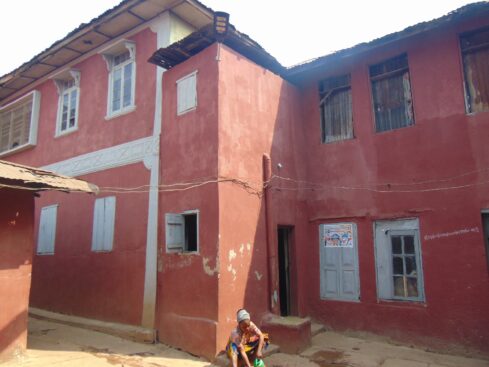
He mentions that Uthman Basunu was born in 1770 and left Katsina in 1835 for Ibadan, where he was warmly received by Olubadan Oluyole at that time. Ibadan began as a war camp and was a direct fallout of the Yoruba civil wars of the 19th century.
The Ifa Oracle had informed the Olubadan that Muslims will come to Ibadan wearing turbans and that he should receive them warmly. The Muslims would help to make Ibadan secure and the city will expand.
According to Mogaji Basunu “The people contacted the Ifa oracle who advised Oba Oluyole that somebody will come from far away and he will wear a turban and carry a staff of religion.”
“The oracle told Oba Oluyole that when the man comes to Ibadan to reside, Ibadan will be peaceful and it will expand. When Basunu settled in Ibadan, they appointed him as the first Imam of Ibadanland. During his time, he prayed for Ibadanland. If they went to war, he will pray for them and they will succeed. They will capture slaves and other things. He also prayed that Ibadan will expand.”
This information is confirmed by a google search which identifies Uthman Abubarri Basunu, ‘native of Katsina or Dindi’, as the second Imam of Ibadanland 1839-1871.
Welcomed by the inhabitants
Oladosu explains “When people heard about Basunu, everybody will want such people to come to their area and whenever such people arrive, they will be welcomed by the inhabitants, not only because of the opportunity their arrival will bring to them, but also what their presence would make happen for them as far as their spiritual, socio-cultural challenges are concerned. People will compete to host such scholars. It was normal that the king of the town will be the best person to host such scholars.”
Wives
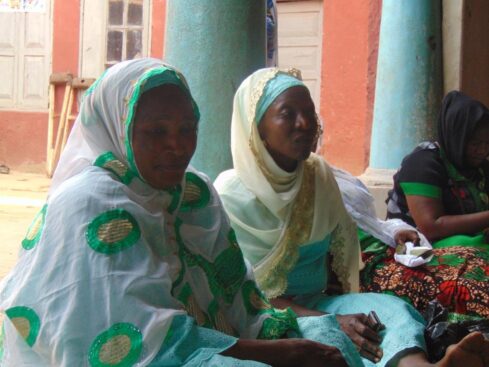
On the fact that the family has become Yorubanised, Mogaji Basunu says that the population of Yoruba wives in the family easily explains this, as well as the fact that the family house itself is in Ibadan. “He came to Ibadan with only one woman, his wife who hailed from Katsina. When he settled down, he married a native. Any person the Ibadan army captured from the war, they gave him as a wife, and then he married some women from other places. That’s the way it happened.”
Biography of Imam Abdullah Uthman Basunu, a work authored by Mogaji Basunu, indicates that Imam Abdullah Basunu (1896-1911), a son of Uthman Basunu, married a total of four Yoruba wives and had 11 children. Also, another work titled Biography of Imam Ahmad Muhalli Uthman Basunu, also authored by Mogaji Basunu, indicates that Imam Ahmad Muhalli Basunu (1940-1982) had a total of six Yoruba wives and 14 children. This helps to reveal how the process of assimilation and identity change took place.
“During the reign of Oba Oluyole, Uthman Basunu got married to three Yoruba women. During that time, he had 15 sons and 15 daughters from these three wives. Subsequent generations continued the tradition of marrying Yoruba wives. The family continues marrying Yoruba wives,”explains Mogaji.
More on assimilation
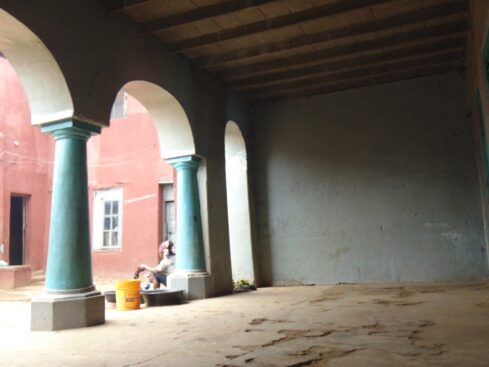
Professor Olaniyi highlights the process of assimilation, drawing an example from Kano. “There were Yoruba who arrived Kano in 1912 and got assimilated also. Instead of staying in Sabon Gari Kano, because that was the year Sabon Gari was established, some of them preferred to reside within the Birni or city, under the leadership of the Emir, not under the leadership of the British.”
“Those who opted to stay in Birni, overtime became Hausanised. They became assimilated in terms of food, cuisine, attire.”
He argues “We don’t know whether Basunu maintained his identity, whether the change occurred during the second generation, or the second, or third set of generations. My assumption is the fact that he decided to marry Hausa wives, I think by that time, may not be appropriate. I think, at least one wife may have been Yoruba,” explains Olaniyi commenting on the way one group assimilates another.
Chief Imams
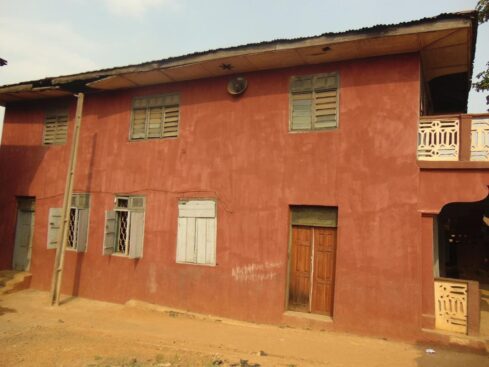
In the 19th Century, many Islamic clerics moved southwards from cities such as Katsina and Kano. Toyin Falola in an article published in ‘State And Society In The Sokoto Caliphate’ edited by Kani and Gandi, sheds light on this process. “Although it was only in Ilorin that an emirate was established, the Jihad and the spread of Islam enabled Muslims to gain power or political influence in many Yoruba towns. Mosques became centres of socio-political events, and the Chief Imams in places such as Lagos, Abeokuta, Ibadan and Osogbo were of northern origin. They were tolerated, supported and even patronized.”
Family
“We are more than 3,500. We have members of our family in US, UK, also in Saudi Arabia as well as Egypt and other parts of Africa. Ibadan is our family home in Nigeria. We are spread all over the world,” says Ridwan commenting on the size of the Basunu family.
“Many of our sisters have gone back to Kano to live there as well as Katsina. There is Maryam now in the UK and she speaks Hausa fluently,” says Ridwan.
99.9% Yoruba
He states “Here, we have little or no one speaking Hausa presently. My sister here understands Hausa. She is the last daughter of Imam Muhalli. My mother Hajiya Hafsat also speaks Hausa fluently. In the household here, there is very little spoken Hausa. We have mingled with Yoruba. Presently, we are 99.9 percent Yoruba in the household.”
Ibadan is home
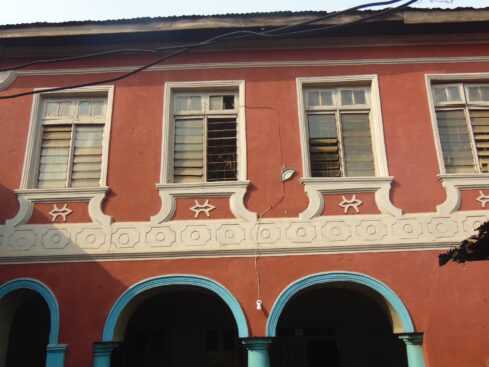
“We are not discriminated against here. Ibadan itself is a settlement, people migrated from different towns and so we have been accepted here. Oba Oluyole himself came from Oyo. We also have people from Ekiti here, as well as from many other places in Yorubaland. They all migrated here. We all came from Katsina and have stayed in Ibadan for more than a hundred years,” states Ibrahim Basunu, an Engineer and member of the family.
Amala
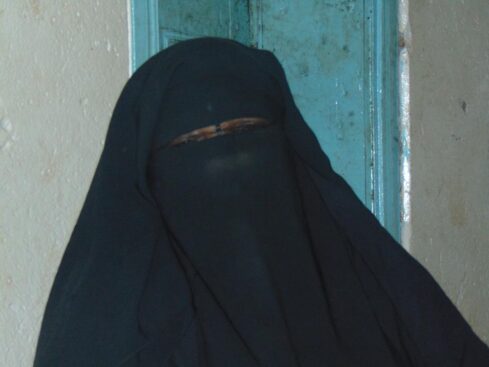
Nafisat Basunu, a housewife, comments on the choice of meals in the Basunu household. “We have different kinds of foods eaten in the Basunu family. Amala is our best food. Eba, rice, yam, beans, Tuwo are other meals we are fond of. Gbegiri, Efo riro and Ewedu soups are also very popular among us. Our meals are largely Yoruba. Tuwo is not regularly eaten.”
She reveals “Children tend to go for the Yoruba meals more than the Hausa.”
Islamic names
“We embrace Islamic names. None of us bear other names. At naming ceremonies, we are given Muslim names first then other Yoruba names are added. Yoruba normally add the Oriki or praise name. For instance, the Mogaji here is Nurudeen. Nurudeen is an Islamic name and Titilope is a Yoruba name. This is to show that we are Hausa, as well as Islamic clerics and part of Yoruba,” posits Ibrahim Basunu, opening up on the choice of names in the family.
On the nature of the architecture of the house, Mogaji Basunu explains “This house was built by Yorubas but the design is from the north. The contractor that built the house most likely is Yoruba, but the structure is a replica of what can be found in the north.”
“One of our daughters is studying in Bauchi. I told her to listen well to her Hausa colleagues so as to learn from them,” a member of the family points out.
Nation building
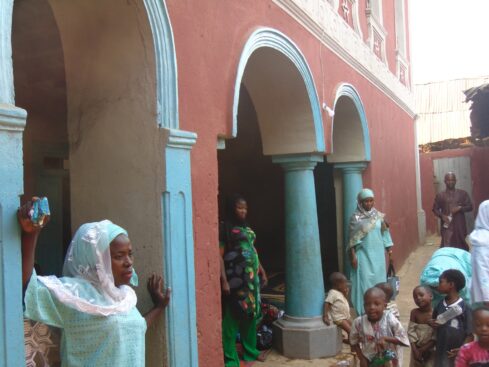
Oladosu speaks on the contribution of Islamic clerics to nation building. His words “When you talk about impact on nationhood or nation building, you want to ask how many professors of Arabic and Islamic studies do we have in Nigeria now. We can talk about the first department of Arabic and Islamic Studies in South West Nigeria. In this wise, you then talk about Ibadan. The department of Arabic and Islamic studies was established in 1962 and it has led to the establishment of those other universities where these twin disciplines of Arabic and Islamic studies are being taught. All of them have benefited from Ibadan and Ibadan also benefited from the writings of those scholars, some of which also led to the production of professors even globally.”
Hausa & Arabic
“May Allah protect and guide us, may our children speak more Hausa and Arabic in the future,” prays Mogaji Basunu as the interview draws to a close.
He has a vertical mark on each cheek. In response to my question, he says with a smile that they are ‘Hausa-Fulani marks.’
With his prayer he highlights a quiet need to improve spoken Hausa in the family, whose root and identity has altered in many ways across the past 189 years.
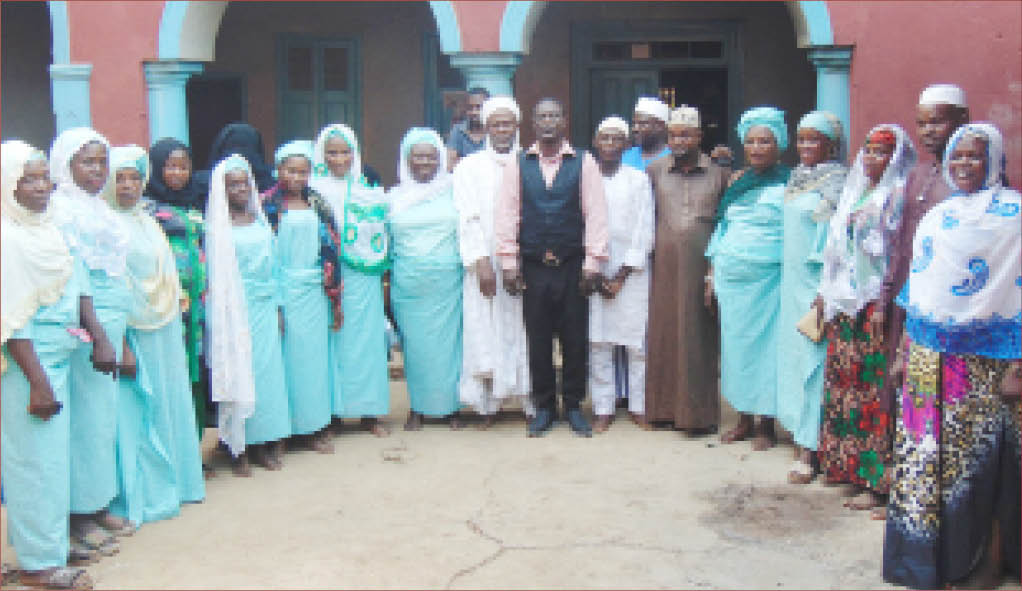
 Join Daily Trust WhatsApp Community For Quick Access To News and Happenings Around You.
Join Daily Trust WhatsApp Community For Quick Access To News and Happenings Around You.
